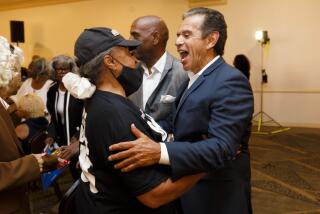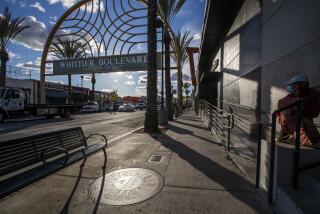Winning isn’t everything
If Tuesday’s election was dull, as many predicted it would be, it certainly turned out to be the most interesting and exciting dull election in a long time. Voter turnout was low, but not bottom-scraping; Mayor Antonio Villaraigosa was elected, but without much enthusiasm; and it appears, pending a tally of thousands of as-yet-uncounted ballots, that voters may have rejected a misleading solar power measure that was backed by the mayor and much of his hand-knit coalition of organized labor, environmentalists and Democratic elected officials.
It may not have been a revolution, but for the mayor and his supporters, it was a fairly nasty bump in the road -- one that should make them pull over and check their directions before getting back behind the wheel.
Read or listen to reports that originate outside Los Angeles and you might think election day was a triumph for Villaraigosa. After all, he was elected to a second term in a landslide with more than 55% of the vote, avoiding a runoff despite a field of nine opponents. His ally Wendy Greuel easily won her race for controller. Another ally, Jack Weiss, won the most votes for city attorney and now faces a May 19 runoff.
Here, things look decidedly different. Against opponents with little political experience, a dearth of funding and no political apparatus to match the machine he has constructed, the mayor ended up with a lower percentage of the vote than he had four years ago, lower also than what Mayor Richard Riordan had when he won his second term against the well-known and politically experienced Tom Hayden. This “landslide” is no vote of confidence for Villaraigosa. Nor is it a feather in his progressive cap that less than 15% of eligible Angelenos went to the polls to set their city’s direction for the next four years.
Low turnouts are nothing new here, but the numbers are moving in a decidedly downward trajectory because of many factors -- timing, demographics, civic culture -- and perhaps also in part by design. Many political consultants prefer that their electorates be disengaged and their turnouts low. That way they can concentrate on a select group of voters they consider reliable, and can manage an election and direct its outcome with carefully targeted campaign mailers and get-out-the-vote precinct walking. It’s a cynical expression of distrust in democracy.
Los Angeles deserves more from the progressive coalition now firmly in control of City Hall. This page, for the most part, supports that coalition’s efforts to continue reform of the Police Department, make Los Angeles cleaner and greener, and expand the middle class by attracting high-quality jobs, improving schools and encouraging new housing. But something else was to be part of the package: government openness, transparency, honesty and fair play. The feeling that James K. Hahn wasn’t providing those helped seal his fate four years ago as voters threw him out in favor of Villaraigosa.
That feeling -- that Angelenos are bit players in a politician’s personal story or a prize to be bargained for among parties to a political coalition -- is back, no more so than during the campaign for Measure B, the solar power charter amendment. Villaraigosa and other backers of the measure told voters that the deal struck among environmentalists, labor, public power advocates and the mayor was the city’s only possible route to clean air and green power. What they really wanted was for voters to ratify their deal regardless of whether it was best for the city.
The desire to front-load approval from the electorate is understandable in Los Angeles, where no policy debate ever seems to have a clear end-point. But strong-arming a measure onto the ballot and keeping voters in the dark as to its content and purpose are tactics from the days of secret committees and political bosses, and unbecoming a progressive movement.
This page wants, and believes that Angelenos want, an effective solar energy program. Measure B contains, along with its flaws, components of such a program, which can proceed regardless of the final vote. There is no point in waiting; the Department of Water and Power should move forward with its in-basin solar plan and send it to the City Council, within 90 days, for approval, whether the final vote count shows the measure to have passed or failed. If it passes, city officials should be chastened by the skepticism expressed at the polls and should ensure that citizen oversight is robust; if it fails, they should still produce the best solar plan for the city, and expect vigorous and constructive debate.
More to Read
Get the L.A. Times Politics newsletter
Deeply reported insights into legislation, politics and policy from Sacramento, Washington and beyond. In your inbox three times per week.
You may occasionally receive promotional content from the Los Angeles Times.









